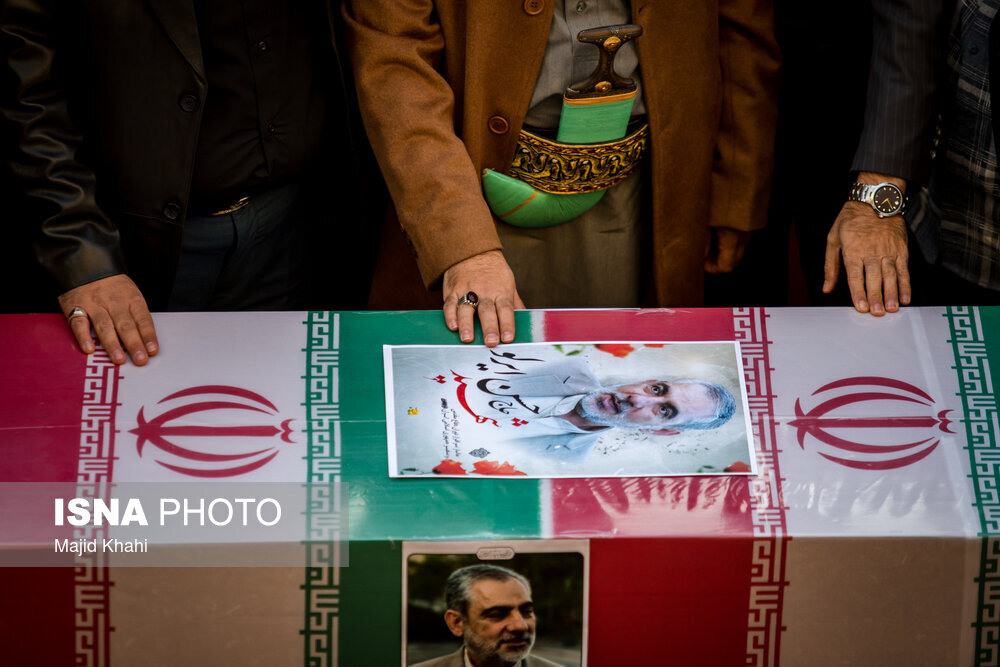Iran to sue Riyadh for deliberate delay that led to ambassador’s death

TEHRAN - Foreign Minister Hossein Amir Abdollahian on Tuesday afternoon blamed some executive bodies in Riyadh for a delay in allowing Iran’s late ambassador to Yemen, who was suffering from the COVID-19 infection, to exit the Saudi-besieged country, saying Iran will lodge a formal protest over the delay in accordance with international law.
Ambassador Hassan Irloo, 63, died of COVID-19 complications on Tuesday. He had earlier this week been repatriated from Yemen amid a Saudi-led blockade of the war-torn Arab country to receive treatment at a hospital in Tehran.
Speaking to reporters on the sidelines of the ambassador’s funeral procession in Tehran, Amir Abdollahian said prior to Irloo’s death, the Foreign Ministry had been trying for several days to obtain a permission from Riyadh via a third country to send a plane either from Iran or another state to Sana’a to bring back the diplomat home and immediately transfer him to a hospital in Tehran for treatment.
“However, the Saudi side was unfortunately very late in making a decision in this regard and some executive bodies of Saudi Arabia dragged their feet,” he added.
“We will formally lodge a protest in accordance with international conventions,” he remarked.
Also, he expressed hope that Yemen will be able to get out of this war “as soon as possible through a political solution.”
He once again reiterated Iran’s stance on the need to resolve the ongoing crisis through political channels, saying Tehran believes all Yemenis should play a role in determining their country’s future.
The chief diplomat condemned the military campaign that the Saudi regime and its allies have been waging on Yemen since early 2015.
“The experience of (more than) six years of war showed that the aggressors cannot achieve any victory through military means. Yemen must be left to the Yemenis themselves so that the problems will be solved through the intra-Yemeni talks,” he added, according to Press TV.
Ali Akbar Velayati, Iran’s former foreign minister and current senior foreign policy advisor to the Leader of the Islamic Revolution, issued a message on Tuesday offering condolences over the death of the ambassador.
Velayati praised the “indefatigable” efforts of Ambassador Irloo.
“The news of the martyrdom of the revolutionary, kind-hearted, and leading diplomat of our country Hassan Irloo, the ambassador of Iran to the National Salvation Government in Yemen, was very regrettable and tragic,” Velayati said in his message.
In a message on Tuesday, Iranian Parliament Speaker Mohammad Baqer Qalibaf also condoled martyrdom of Irloo. “The demise of the disabled war victim, the late brave Iranian ambassador Hassan Irloo, the brother of two martyrs of the Iraqi-imposed war, was a very sad news,” wrote Qalibaf.
During his two-year mission in Sana’a, Irloo made efforts to help find a political solution to the Yemen conflict, end the war in the impoverished country and restore stability, security and peace to it, Foreign Minister Amir Abdollahian said.
Saeed Khatibzadeh, spokesman for Iran’s Foreign Ministry, said Irloo was transferred to the country in a “bad state” due to the “late cooperation” of some countries, a reference to Saudi Arabia.
The Wall Street Journal had reported that Riyadh claimed there were no signs the ambassador was seriously ill and that in return for allowing Irloo to leave Yemen, Riyadh had asked the Houthis to release a number of Saudis captured by the resistance forces.
Saudi Arabia controls the airspace around the Yemeni capital, Sana’a. The ambassador was flown out of Yemen aboard an Iraqi military aircraft after negotiations by Oman’s government with the Saudi kingdom.
The death of the ambassador is only an example of hundreds of thousands of deaths who have no voice.
According to the Guardian, the Norwegian Refugee Council’s country director for Yemen, Erin Hutchinson, said the Saudi-led attack on Sana’s airport “would not change much for the millions of impoverished Yemenis who were already cut off from the rest of the world. Thousands of them die anonymously, waiting for life-saving medical flights promised years ago and never followed through. But it should serve to open the world’s eyes to the madness that is punishing millions of civilians who have no say in this conflict.”
Irloo, a war veteran, had sustained injuries from chemical warfare during Iraq’s war against Iran in the 1980s.
He contracted the coronavirus at the place of his mission and passed away early on Tuesday “despite undergoing all stages of treatment to improve his condition”, Khatibzadeh said.
Irloo officially began his diplomatic mission to Yemen in November 2020, in defiance of the U.S. opposition to close ties between Tehran and Sana’a.
In December 2020, he was sanctioned by the former U.S. president Donald Trump.
Saudi Arabia, backed by the U.S. and regional allies, launched the war on Yemen in March 2015, with the aim of reinstalling the toppled Yemen’s former president Abd Rabbuh Mansur Hadi and to crush the popular Ansarullah movement.
The Saudi war has left hundreds of thousands of Yemenis dead, and displaced millions more. It has also destroyed Yemen’s infrastructure and spread famine and infectious diseases in the Arab country.
The Yemeni people are still suffering as a substantial humanitarian crisis caused by the long-running war continues, but efforts to put an end to the fighting have failed.
Despite Saudi Arabia’s relentless bombardment of the impoverished country, Yemeni armed forces and the allied popular committees have grown in strength against the Saudi-led invaders.
Leave a Comment